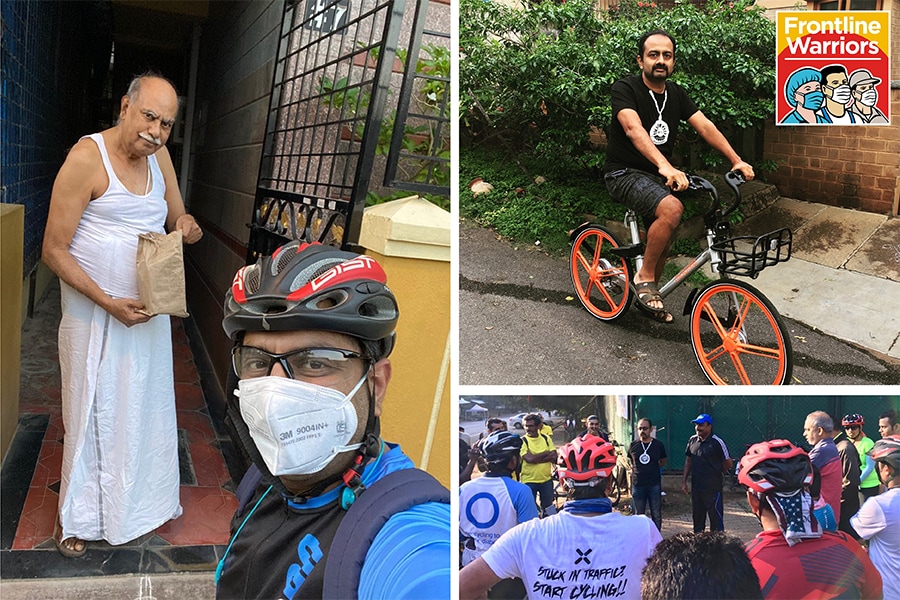
Elderly or in Covid-19 quarantine? These cyclists will pick up your daily essentials
Across seven cities, volunteers on bicycle help deliver groceries and medicines to keep the vulnerable safe at home
 Relief Riders, a group of cycling enthusiasts led by Sathya Sankaran (top right), delivers groceries and medicines for the elderly or families that are stuck at home with Covid-19
Relief Riders, a group of cycling enthusiasts led by Sathya Sankaran (top right), delivers groceries and medicines for the elderly or families that are stuck at home with Covid-19
For three years, Sathya Sankaran has been spearheading Bengaluru’s Cycle To Work movement. As the city’s first bicycle mayor, an ambassadorial post given to him by Bycs, an Amsterdam-based social enterprise, the 46-year-old has built the campaign ground up, with almost 2,000 volunteers, and helped the city reduce 154,593 kg of carbon emissions. Last March, when the lockdown was announced and essential supplies hit a roadblock, Sankaran and his colleagues rolled out their bikes to reach groceries, medicines etc to the elderly, who were most vulnerable to the virus. “Over two months, till Mission Unlock began, 80 volunteer riders served more than 250 people,” he says.
When the second Covid-19 surge began in April, cases soared and localised lockdowns returned, Sankaran didn’t have to think twice about jumping in to mitigate the crisis. The goal: To keep the elderly, the biggest risk category, safe and at home so the pressures on oxygen and hospital beds could be reduced. “Everyone’s thinking big—hospital beds, oxygen cylinders, ventilators etc. Nobody’s thinking of groceries and regular medicines. But these items are not going to walk into your home. And we couldn’t let the older people step out for these,” he says.
Sankaran and his gang, christened Relief Riders, restarted their operations in Bengaluru on April 27, and, in about a week or so, have scaled up to seven cities through 450-odd volunteers. While the team has clocked 180 sorties pan-India, in Bengaluru alone, they’ve done 90 (till May 4), logging 1,143 km and saving about 300 kg of CO2 emissions.
Every time a senior citizen needs a pick-up from the corner shop, all they need to do is to call up the helpline numbers. A set of frontline call-handlers will then verify their requests, filter out the frivolous (or those that don't fall within their purview, like an oxygen concentrator), and pass them on to a back-office team that figures out who should be assigned the sorties. The entire journey is run seamlessly through a WhatsApp group and Google Docs, where assignments are tabulated and marked when complete. Since each city has its unique set of features—like, standalone houses in Bengaluru to high-rises in Gurugram and Mumbai—culture and lockdown rules, each unit functions independently, touching base every now and then to exchange notes.
“Even though there are stages of handling requests, we don’t work in silos. Everyone goes out for deliveries. We mostly operate outside curfew hours, but our lines are open all day and we deliver emergency items like medicines during curfew as well,” says Sankaran. Once an item is picked up from the store, the volunteers drop them in a bag and pick up the cash (“Senior citizens are not comfortable with UPI or online payments”), both kept outside. “That way, we ensure every delivery is fulfilled no-contact,” he adds.








